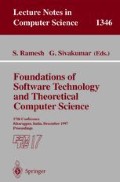Abstract
In this paper we improve on some results of [3] and extend them to the setting of implicit definability. We show a strong necessary condition on classes of structures on which PSPACE can be captured by extending PFP with a finite set of generalized quantifiers. For IFP and PTIME the limitation of expressive power of generalized quantifiers is shown only on some specific nontrivial classes. These results easily extend to implicit closure of these logics. In fact, we obtain a nearly complete characterization of classes of structures on which IMP(PFP) can capture PSPACE if finitely many generalized quantifiers are also allowed.
We give a new proof of one of the main results of [3], characterizing the classes of structures on which L ω∞,ω (Q) collapses to FO(Q), where Q is a set of finitely many generalized quantifiers. This proof easily generalizes to the case of implicit definability, unlike the quantifier elimination argument of [3] which does not easily get adapted to implicit definability setting. This result is then used to show the limitation of expressive power of implicit closure of L ω∞,ω (Q).
Finally, we adapt the technique of quantifier elimination due to Scott Weinstein, used in [3], to show that IMP(Lk(Q))-types can be isolated in the same logic.
Preview
Unable to display preview. Download preview PDF.
References
A. Dawar. Feasible Computation through Model Theory. PhD thesis, University of Pennsylvania, Philadelphia, 1993.
A. Dawar, S. Lindell, and S. Weinstein. Infinitary logic and inductive definability over finite structures. Information and Computation, 119(2):160–175, June 1995.
Anuj Dawar and Lauri Hella. The expressive power of finitely many generalized quantifiers. Information and Computation, 123(2):172–184, 1995, Extended abstract appeared in LICS94.
H. Ebbinghaus and J. Flum. Finite Model Theory. Perspectives in Mathematical Logic. Springer, 1995.
Lauri Hella, Phokion G. Kolaitis, and Kerkko Luosto. How to define a linear order on finite models. In Ninth Annual IEEE Symposium on Logic in Computer Science, pages 40–49, 1994.
Phokion G. Kolaitis. Implicit definability and unambiguous computation. In Fifth Annual IEEE Symposium on Logic in Computer Science, pages 168–180, 1990.
S. Lindell. An analysis of fixed-point queries on binary trees. Theoretical Computer Science, 85(1):75–95, 1991.
A. Seth. When do fixed point logics capture complexity classes. In Tenth Annual IEEE Symposium on Logic in Computer Science, 1995.
Author information
Authors and Affiliations
Editor information
Rights and permissions
Copyright information
© 1997 Springer-Verlag Berlin Heidelberg
About this paper
Cite this paper
Seth, A. (1997). Sharper results on the expressive power of generalized quantifiers. In: Ramesh, S., Sivakumar, G. (eds) Foundations of Software Technology and Theoretical Computer Science. FSTTCS 1997. Lecture Notes in Computer Science, vol 1346. Springer, Berlin, Heidelberg. https://doi.org/10.1007/BFb0058032
Download citation
DOI: https://doi.org/10.1007/BFb0058032
Published:
Publisher Name: Springer, Berlin, Heidelberg
Print ISBN: 978-3-540-63876-6
Online ISBN: 978-3-540-69659-9
eBook Packages: Springer Book Archive

